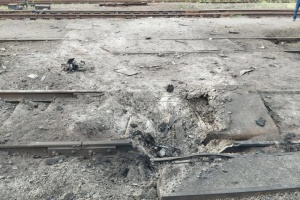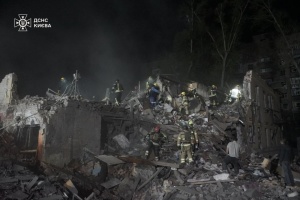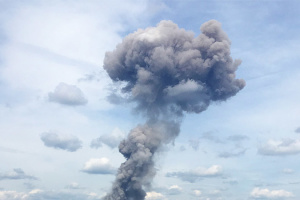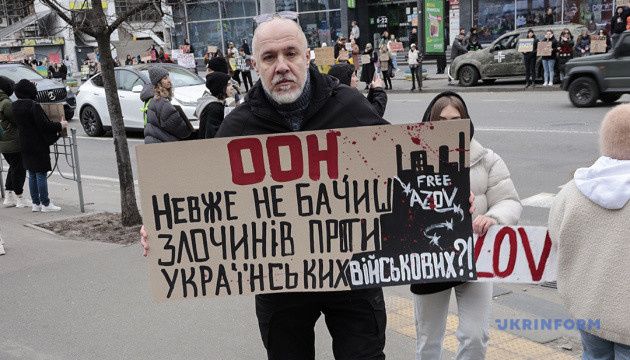
Save Mariupol Defenders: Stories about Organized Struggle Pursued by POW’s Families
The Association of Azovstal Defenders’ Families is the most renowned and currently most active NGO that is addressing challenges faced by Ukrainian veterans and prisoners of war. In the spring of 2022, the Association was founded by families of the Mariupol defenders in captivity, who were heroically defending the city at its last remaining bridgehead of defense - the Azovstal steel mill, and were forced to surrender to Russian captivity against Russia’s safety guarantees, following an order from President Zelensky. The initiative was launched with a mission to publicize the problems facing the Azovstal defenders still remaining in captivity, as well as organize events to facilitate rehabilitation of those released from Russian captivity. The Association is growing in renown, with the number of its followers amounting to over 75,000 on Instagram and approximately 42,000 on Facebook.
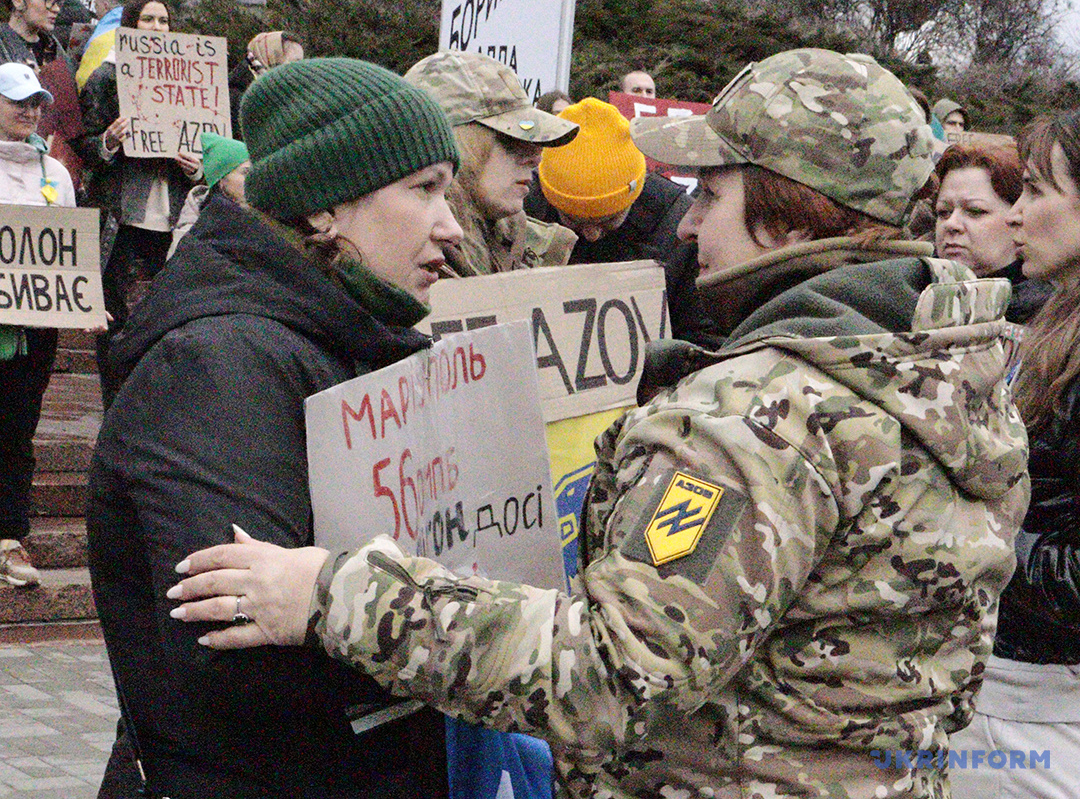
THE ASSOCIATION OF AZOVSTAL DEFENDERS’ FAMILIES --AN EXAMPLE OF THE COMMUNITY’S POWER AND UNIFICATION
"After the announcement that the Mariupol Garrison had left Azovstal, we realized that we need to consolidate our powers in one way or another. Certain processes (the authorities' communication with the Red Cross and other international partners regarding the protection of military service members’ rights - ed.) had got underway, so we wanted to be part of them," Marianna Homericki, co-founder of the Association of Azovstal Defenders’ Families, says in a comment.
Just on the first day the Association was founded, Marianna became the press secretary for the organization, with a responsibility to reach out the public about the events this platform was initiating.
"I myself served in the Azov Regiment from 2017 to 2021. All the guys and girls who were fighting at Azovstal are all my friends, and so I have a strong motive to help them, because I am not indifferent to their fate," says Marianna.
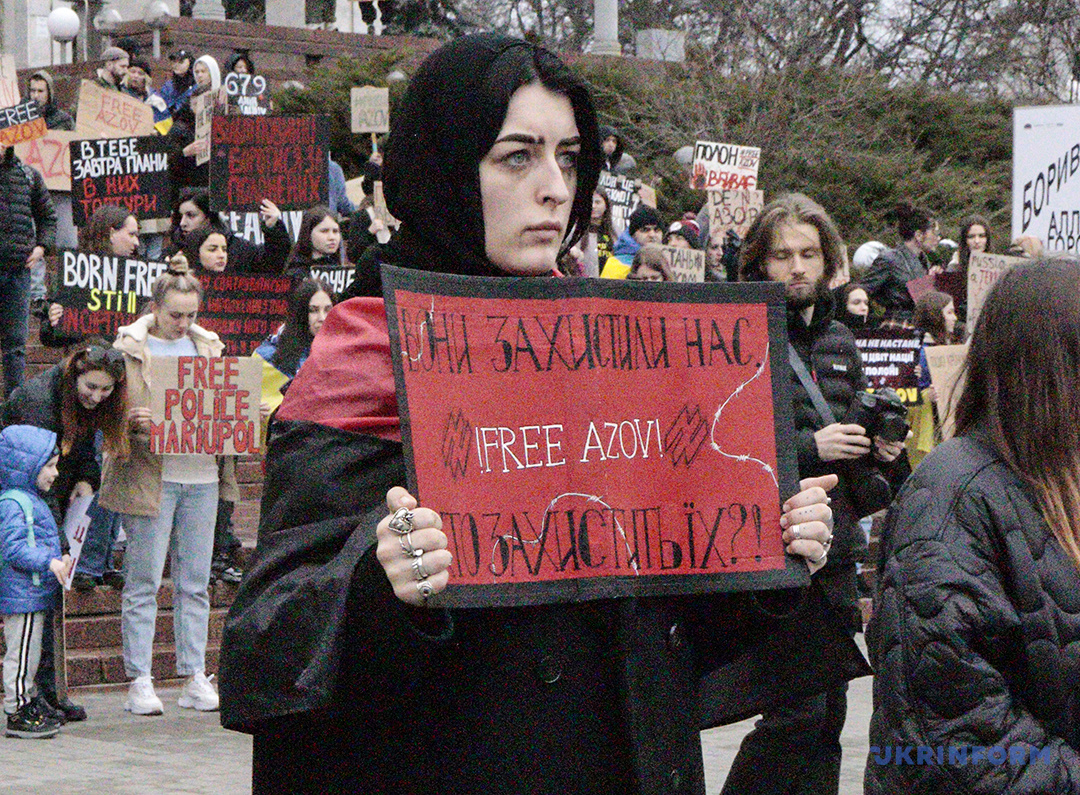
It is worth noting that the organization is no party to official negotiations regarding the future fate of the Azov defenders in captivity. This responsibility rests with the Coordinating Headquarters for the Treatment of Prisoners of War. However, its campaigners, being representatives of the public, are publicizing the theme of captivity and providing support to families of the Mariupol Garrison fighters.
"The Association holds a fund that accumulates donations from those who care; we also sell merch, and direct 100% of revenues to pay for the needs and rehabilitation of families of prisoners of war and fallen defenders of Azovstal," Marianna explains.
"Activity in social networks, spontaneous rallies, individual pickets - everything should reveal that we are not looking for ways to hide from reality and are fighting for those who fought for us," adds Olena Yushchenko, a public activist and an attendee to rallies in support of Azovstal defenders.
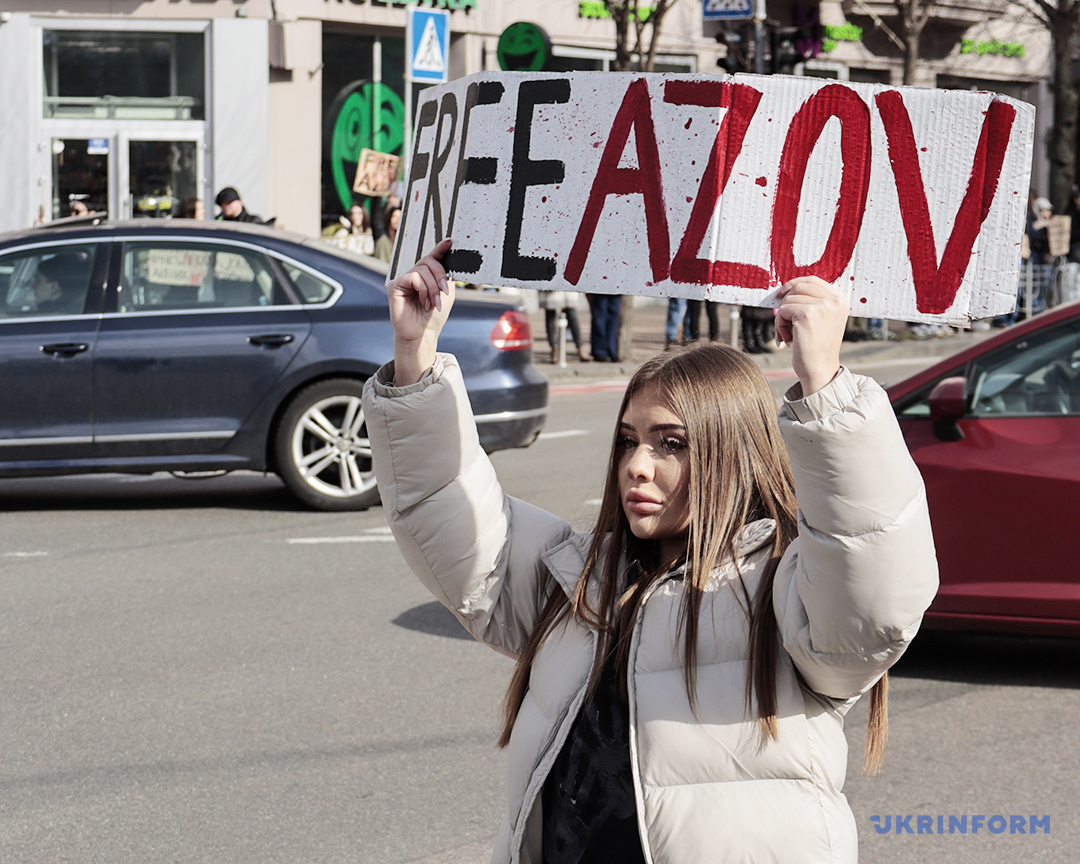
AZOVSTAL. A BACKGROUND
The brutal Russian siege of the Mariupol city lasted 86 days, including 82 days during which Ukrainian defenders had had to fight off attacks while being fully encircled by Russian invading troops. The last bridgehead of defense in Mariupol had fallen on May 21, 2022, the day when all the survived members of the local garrison left Azovstal, and Russia immediately announced it had taken them in captivity. Soldiers of the Mariupol garrison were holding the fort with little medicines, food and other critical supplies. The General Staff and the President of Ukraine said in a later statement that, thanks to their feat, Ukraine was able to buy time, regroup its forces, and secure other cities, so that they do not repeat the Mariupol’s fate," says Marianna Homericki.
President Zelensky has repeatedly highlighted the issue of Azovstal defenders in captivity in his public speeches and interviews to Ukrainian and international media outlets, emphasizing: "These people (defenders of Azovstal - ed.) performed a truly heroic feat by defending Mariupol for as long as they could”.
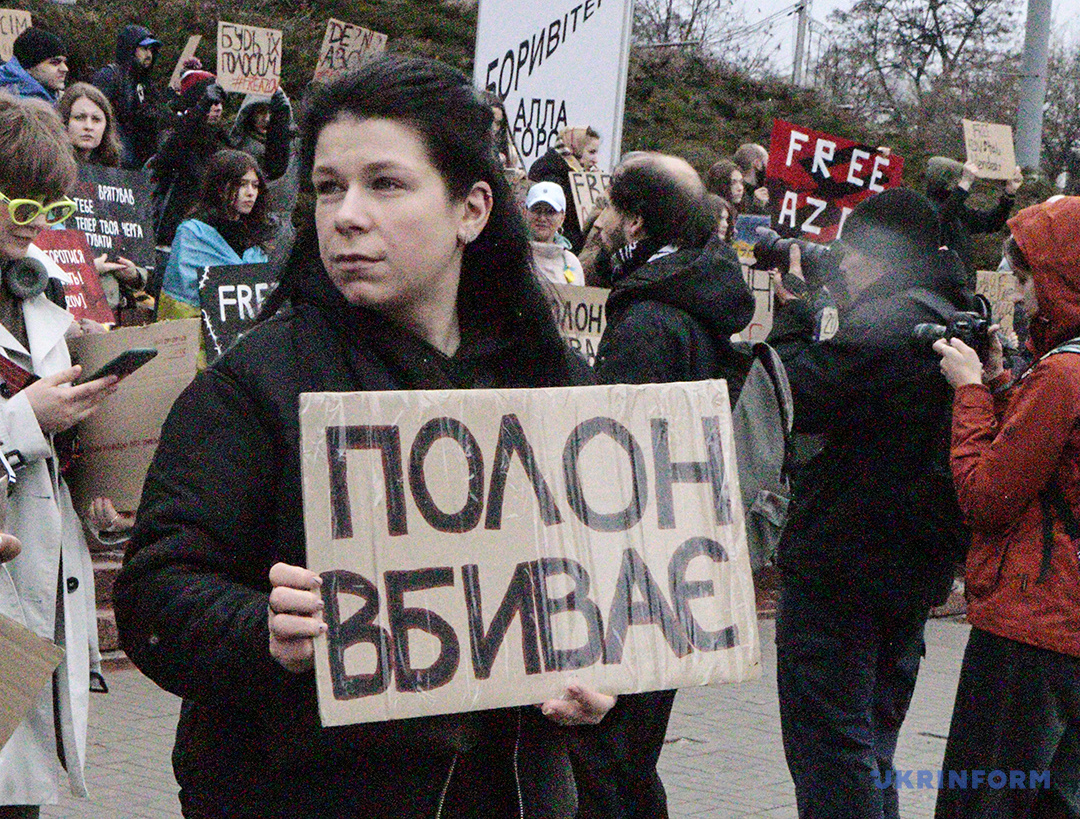
He also noted that at the time the Mariupol Garrison was holding the fort at Azovstal, a series of attempts were made to evacuate people and supply armaments, food, and medicines to support the defenders. "We lost many pilots who, realizing that 90 percent of the missions would be unsuccessful, still flew their missions in an attempt to help out the soldiers there, and this, it is worth noting, had brought its effects," Zelensky emphasized in a televised interview.
According to the President, it was “impossible to de-block the city of Mariupol using military force. Ukraine’s military leadership made a decision for the garrison to leave the territory of Azovstal and surrender to Russian captivity. After that, the release of the Mariupol defenders was to take place via diplomatic channels, in particular, with the mediation of the UN, the Red Cross and, no matter how strange it sounds, against security guarantees from the Russian Federation. "Our prime principle still remains as it was - all Ukrainians should get back home. We are intensively working on that matter with our partners," Zelensky added.
Despite this, according to the Association of Azovstal Defenders’ Families, more than 900 soldiers of the National Guard’s 12th Azov special operations brigade still remain in Russian captivity.
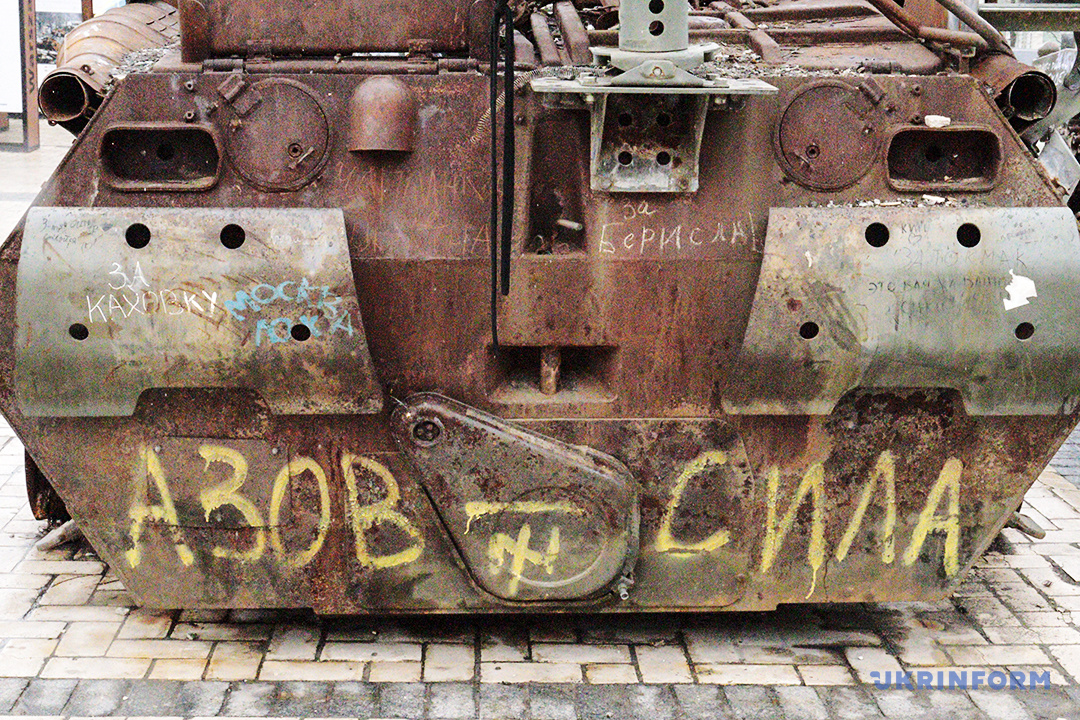
That being said, the Association’s founders are stressing that information is currently not accessible regarding the POW’s future fate and current health status. Representatives of international organizations - the Red Cross and the UN Committees against Torture and on Human Rights – would be advised to visit the prisoners, monitor their health and living conditions, as well as correspond with their families, but this is not happening, Marianna goes on to say.
"They have certain obligations, prescribed by international conventions. However, there are doubts as to whether they perform their work as they should. Every day news is coming about the Russian Federation pressing new charges against our guys, about them being subject to torture during interrogations, about the inhumane conditions of their detention. Moreover, we are learning about all this from those released from captivity, not from the Red Cross among others," says the co-founder of the Association.
"Unfortunately, with every prisoner exchange, we see that the lack of action from the International Committee of the Red Cross has entailed a situation where our prisoners of war and civilian hostages are being subject to torture on a daily basis – torture with hunger, electricity, and this is precisely because the Russians know for sure that the International Committee of the Red Cross will not intervene, will not demand access to the places of detention of the prisoners of war and civilian hostages, thus demonstrating its inaction." Ukraine’s Human Rights Commissioner, Dmytro Lubinets shared these remarks in an interview with Suspilne broadcaster while on a visit to Zaporizhzhia in October 2022, when work on a mechanism for prisoners’ swap was only in embryonic stage.
This issue is also a concern for Olha, the Association’s member and wife of a prisoner of war.
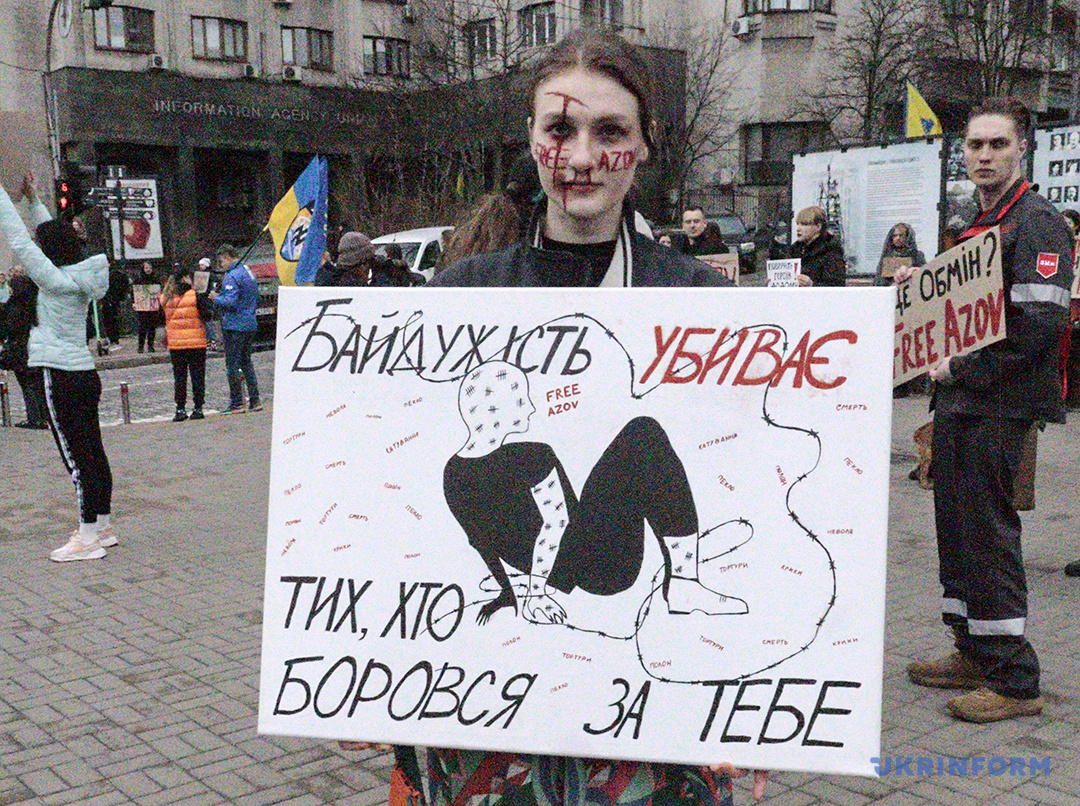
"Being the wife of a prisoner of war, I do not have any information from official sources about my husband's current health status. The only thing I know is that he had had to withdraw and surrender to captivity following an order from the military command," she explains.
That is why the Association, joined with the Coordinating Headquarters for the Treatment of Prisoners of War, is currently implementing an important project - the Road Map, which is aimed at developing an algorithm of action to be followed by families of the defenders who are declared missing or captured in action.
"Unfortunately, no one will search for prisoners on the Internet, so contact only the official authorities - the General Staff, the National Police, the unified SBU center, that is, the organizations that are authorized to help and have everything necessary for this," says Petro Yatsenko, the chief press officer for the General Staff’s Coordinating Headquarters for Treatment of Prisoners of War, justifying the need to appeal to official authorities, rather than the general public.
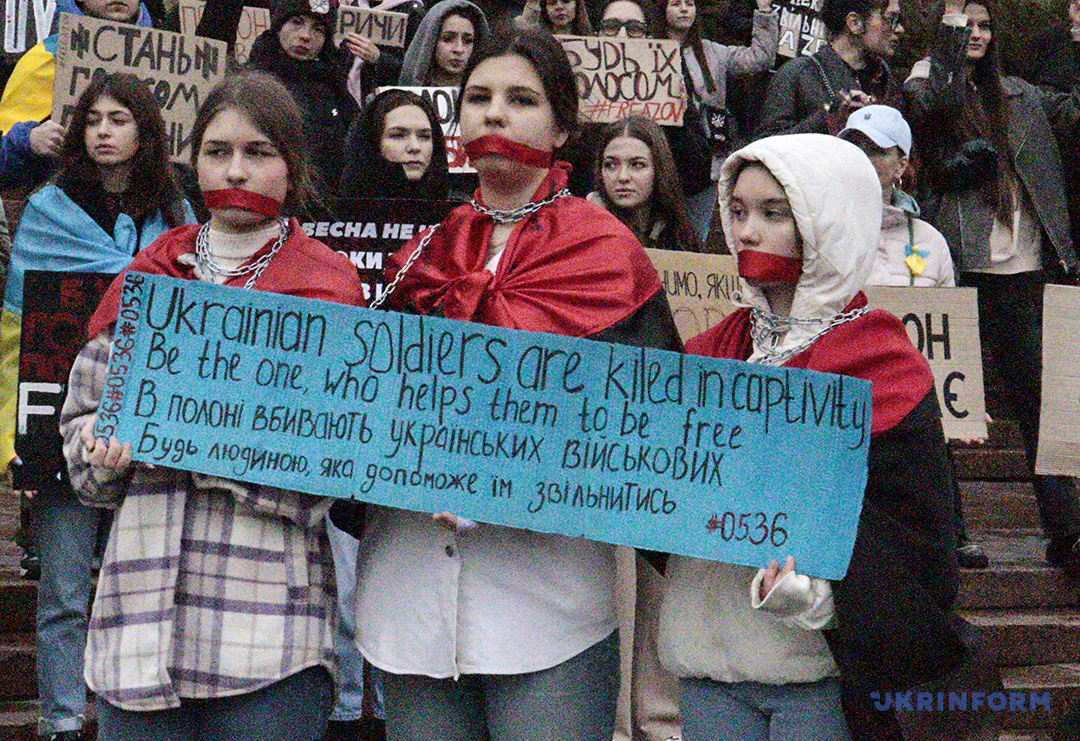
ON THE SIGNIFICANCE OF PUBLIC INVOLVEMENT AND THE IMPACT ON OVERALL SUPPORT
One of the Association’s most important initiatives involves regular rallies in support of the prisoners, which are held almost weekly, in Kyiv and other Ukrainian cities. "The defense of Mariupol is not a turned page; we must make the world know and remember, particularly through the international media, that prisoners are tortured, that they barely survive there in Russian captivity," says Marianna Homericki.
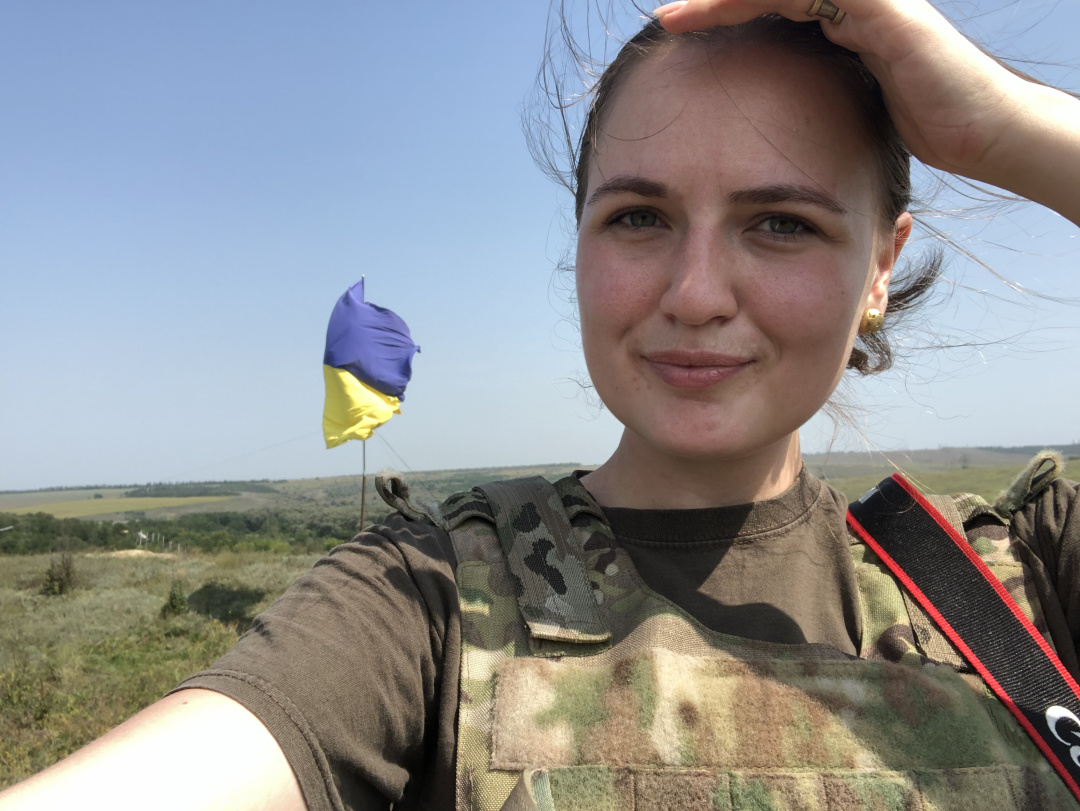
This is what motivates the campaigners to do what they do. "They are surviving for as long as you live", she goes on to say. "For two years now, I am only dreaming about his release from captivity. "When will I have a father again?", "While the prisoner’s wounds are getting rotten, so are the souls of those who don’t care", "Azov is still in captivity – don’t be silent!” – read the signs on their rally posters.
The first thing that can be done to help our soldiers in captivity is not to remain silent, to communicate to the public the need to remember about these people and to provide moral support to their families, the campaigners are confident.
"At first, these were individual pickets staged by the Association’s members. I think that others were just afraid to show up for such pickets and rallies. "I remember there was a myth circulating that drawing attention to the Azov soldiers could do harm, as if their value would grow, and any exchange would thus be disrupted," says a member of the Association named Hanna.
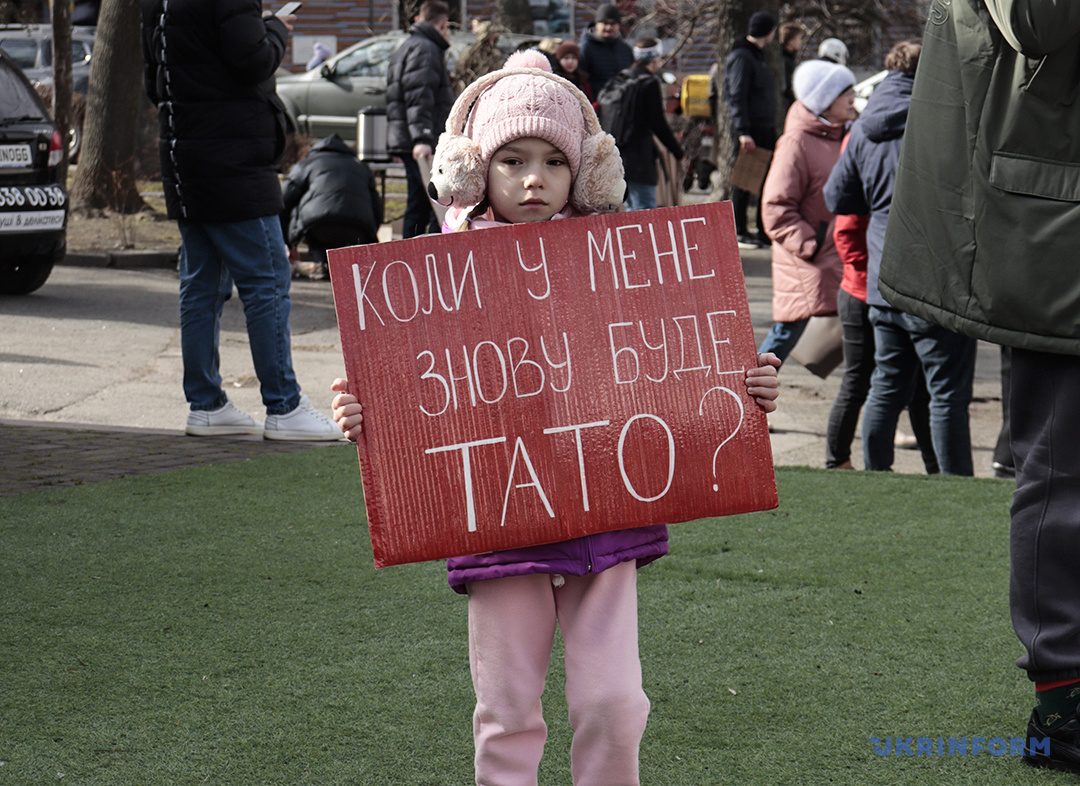
Still, there are concerns about the risk that the public release of information that can reveal the place of service of individual servicemen in captivity can potentially nullify their prospects of being exchanged.
"Do not share or publish on social networks photos of a Defender wearing a military uniform, in which one can identify the location of his last place of stay (disappearance) or the number of the military unit he served with. Disclosure of the specified information may harm the Defender’s health or life or create obstacles to his movements. There were reported instances where local residents in Russian occupied areas were helping the Defenders hide away or travel unseen, or they themselves, disguised as civilians, were trying to breach through the encirclement on their own," the Association said in its statement of recommendations.
Petro Yatsenko, the chief press officer for the General Staff’s Coordinating Headquarters for Treatment of Prisoners of War, has also expressed the same thesis on numerous occasions.
"The prisoners’ swap is an issue that, unfortunately, needs silence. Take, for example, a family’s desire to remind those concerned about their relative or loved one in captivity, which is perfectly normal in a democratic country. However, we are dealing with an enemy who is trying to get us eliminated and does not perceive the Ukrainians as equals. So in this case it works the other way around and can cause harm," he said in an interview to Suspilne broadcaster.
He recommends not to share information about a particular serviceman, especially his rank or the comrades’ names, because this can cause him get exposed while in captivity and the consequent inhumane treatment by his enemies.
"He can say there (in captivity - ed.) that he is a driver, being a sniper actually," Yatsenko explains.
The rallies as such, along with growing public interest in prisoners’ captivity issues are aimed at forcing international organizations to get involved, more closely and effectively, in the prisoners’ exchange processes and thus demonstrate support for Ukrainian prisoners’ families. That explains why the Association, thanks to the balanced approaches used and to its broad reaching information campaign, which is still ongoing, is able to engage more of the prisoners’ families, along with ordinary citizens that just care, to attend their rallies and other events. The initiative of holding rallies to manifest public support for prisoners and their families has continued for two years now, and it has gone far beyond the boundaries of the capital city and even Ukraine. "Sunday is a rally day for me, no matter where I am. First a rally, then everything else. This has become a habit that every citizen of our country should have," says Svitlana, a promoter of the campaign.
Marianna Homericki agrees that the initiative has been growing in outreach and influence. "We started with a rally in Kyiv, which was attended by up to two hundred people, but now this has increased significantly - up to 1,500 interested people attend every time," she says while recommending that potential attendees should follow the announcements on their social networks so as not to come to a wrong location, which are often changed.
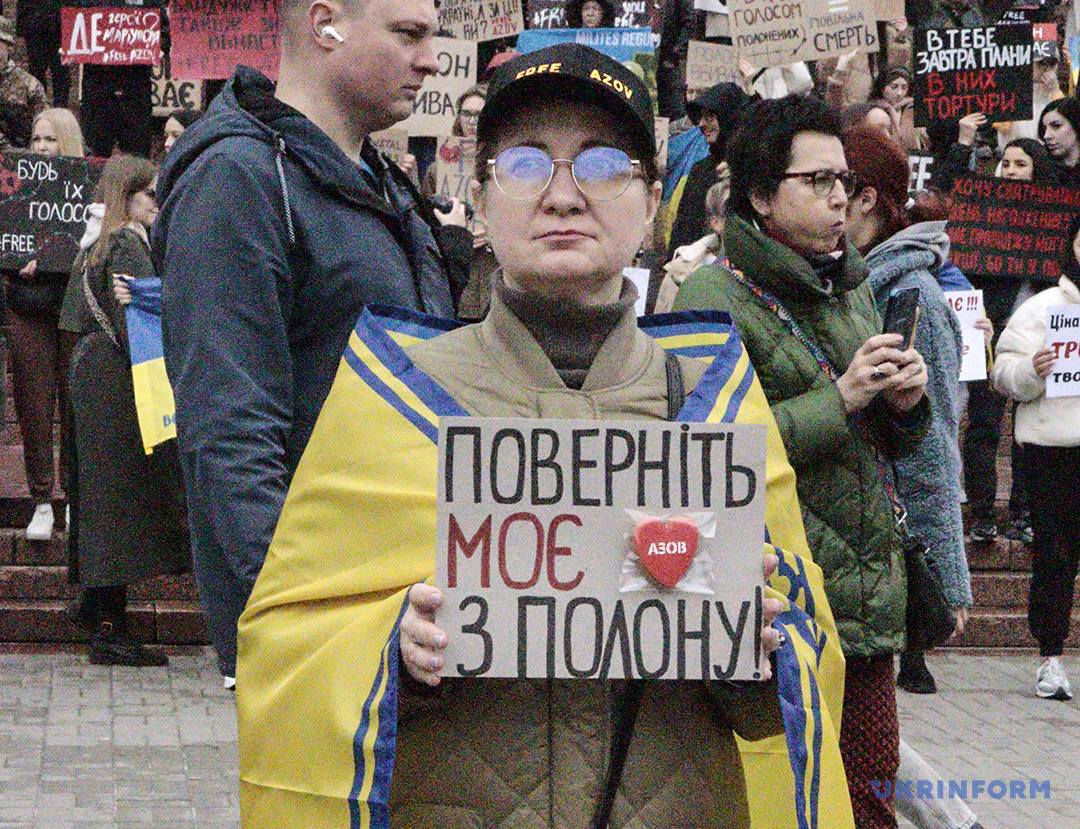
"WHERE IS AZOV? – BRING BACK THE WARRIORS OF STEEL”
Ukrinform reporters have visited several of such rallies hosted by the Association, in order to learn more about its activities and to talk to its members.
"Our son was among those who volunteered to join Azov. He died in Mariupol. Now we are fighting for his comrades," says a fallen soldier’s father, who came to attend the rally. "I want to see my dad again," reads a poster held by a captured defender’s son who came to the rally accompanied by his mother. "We must be worthy of the sacrifice that cost the lives of our defenders. I am here because they were there to save me. This is my duty", Oksana, one of the rally’s attendees told us.
So, the prime myth that these are only the families and friends of war prisoners who are attending such rallies has been busted. Even though the initiative as such came primarily from families and kins of Azovstal defenders, it gained wide publicity among the public and became a permanent manifestation of support for all prisoners of war.
Attendees to the rally have initiated a new option for drawing more attention to the challenges facing Ukrainian prisoners of war – in particular, through performances. This clearly shows a new reality for our defenders.
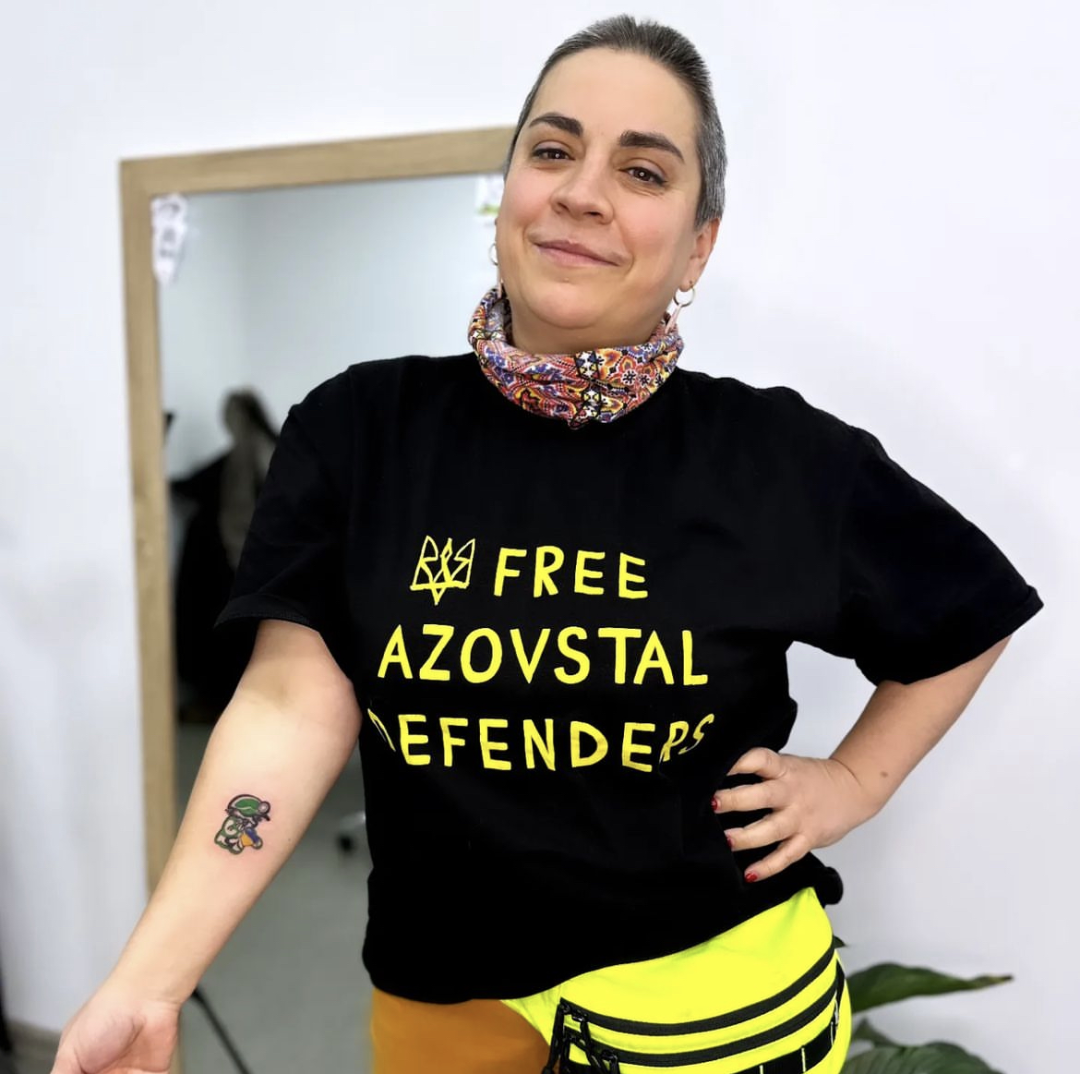
Hanna Kurtsanovska
"I have noticed that people are becoming more and more creative each time. At first it was just posters, followed by slogans, often written in different languages, and now some people are coming with their faces painted. It's an interesting phenomenon, and so I suggested that the challenge of drawing more attention to the issue be addressed via performances of various kinds," says Hanna Kurtsanovska, a member of the Association, a journalist with Svoi.Situ outlet, and author of a series of articles about the Ukrainian soldiers executed by Russians in Olenivka.
At the time of writing this article, she had organized and did five performances. "It is very memorable for people. Ideas come to me quickly - I just buy props and show up for an event. So this is my way of helping," she explaines. Her most reverberating performance was staged in a location outside of the National Taras Shevchenko Academic Theater of Opera and Ballet in Kyiv. The event was timed to coincide with the second anniversary of the tragedy at the Mariupol Drama Theater on March 16, 2022, when the Russian army dropped a half-ton aerial bomb on the building, killing hundreds of Mariupol residents sheltering there.
"When I saw the venue, the drama theater, the idea for the performance immediately came up to my mind. I am standing in front of the drama theater wearing a mask of Putin and holding in my hands a model of the FAB-500 aerial bomb that Russians dropped on the building. But a child was needed for this," Hanna says. This was quickly resolved, because the woman has long been friends with the family of a Ukrainian defender, who was vilely executed by the Russians in Olenivka.
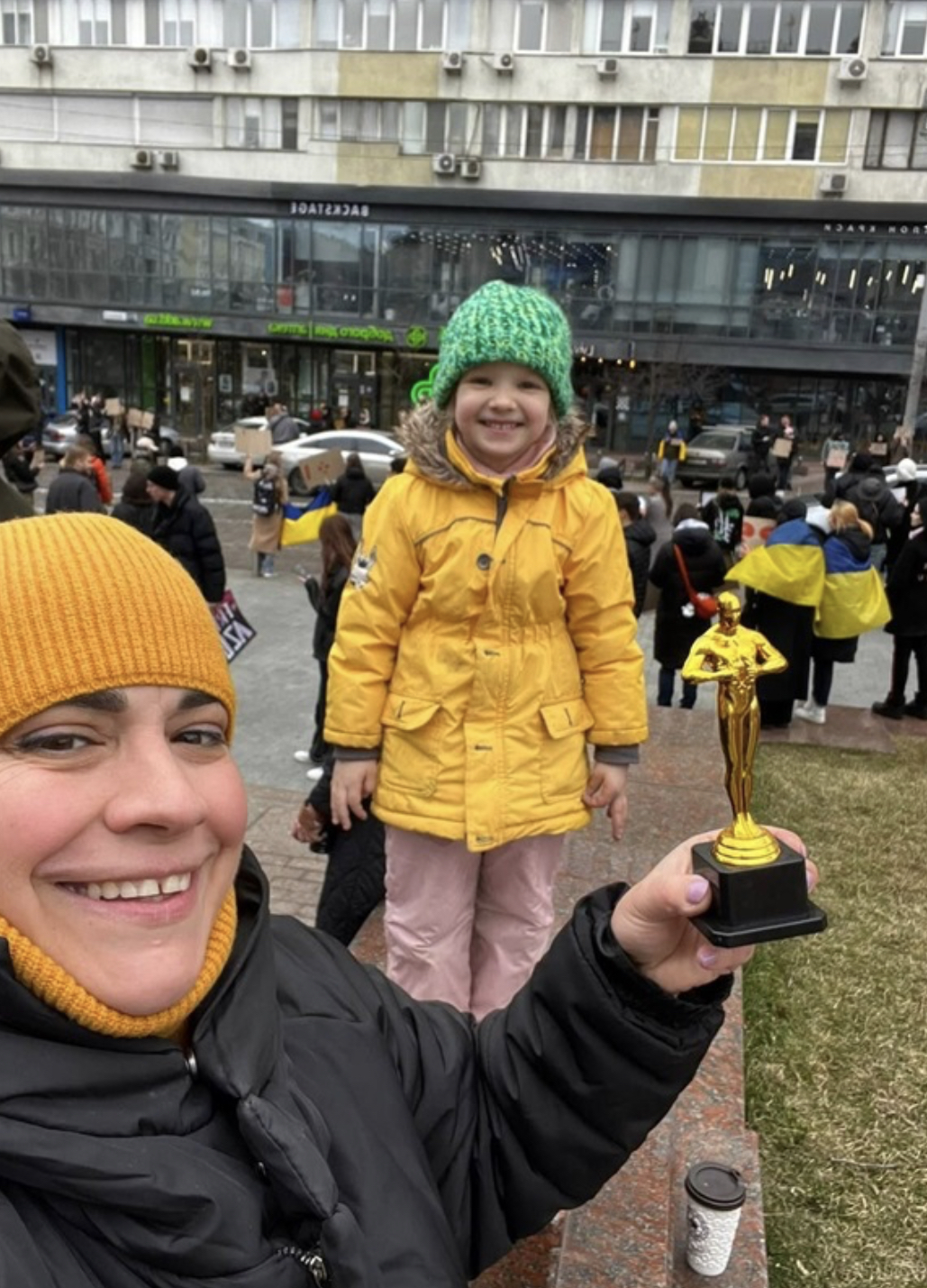
"I immediately thought of Solomiya, 4-year-old daughter of one of our soldiers. Initially, only I, props and Solomiya were supposed to be present there. However, in the process, the girl got nervous and requested that her mother be involved as well. But it turned out to be even more impressive and helped reveal better what kind of enemy we are dealing with, an enemy who is seeking to get the mother and daughter eliminated," said the author of the performance.
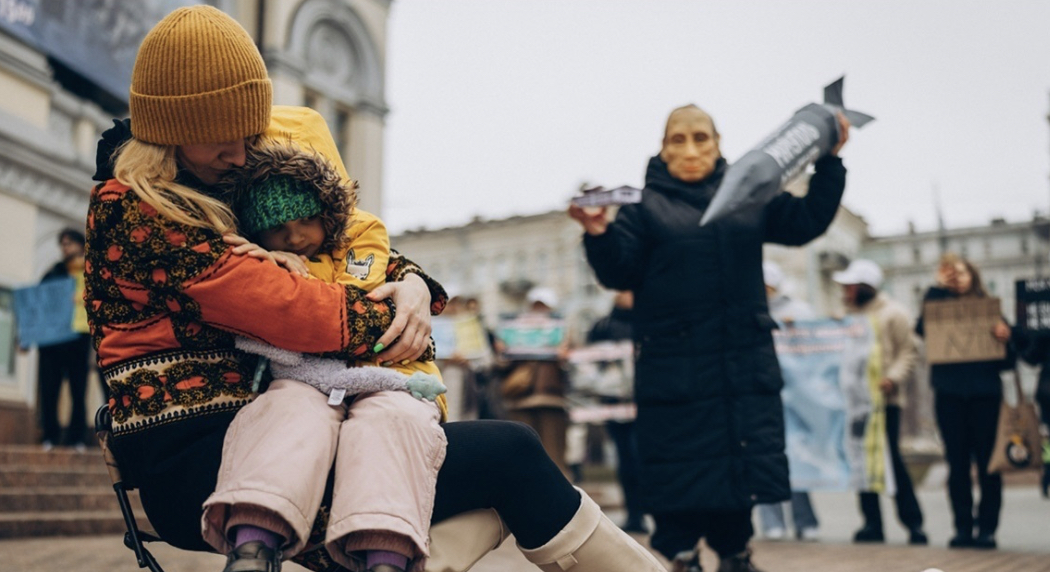
Hanna has no intention to stop there. She is already preparing a new performance, suggested to her by Kateryna Prokopenko, the wife of the released leader of the Azov Battalion, Denys Prokopenko, aka "Redis".
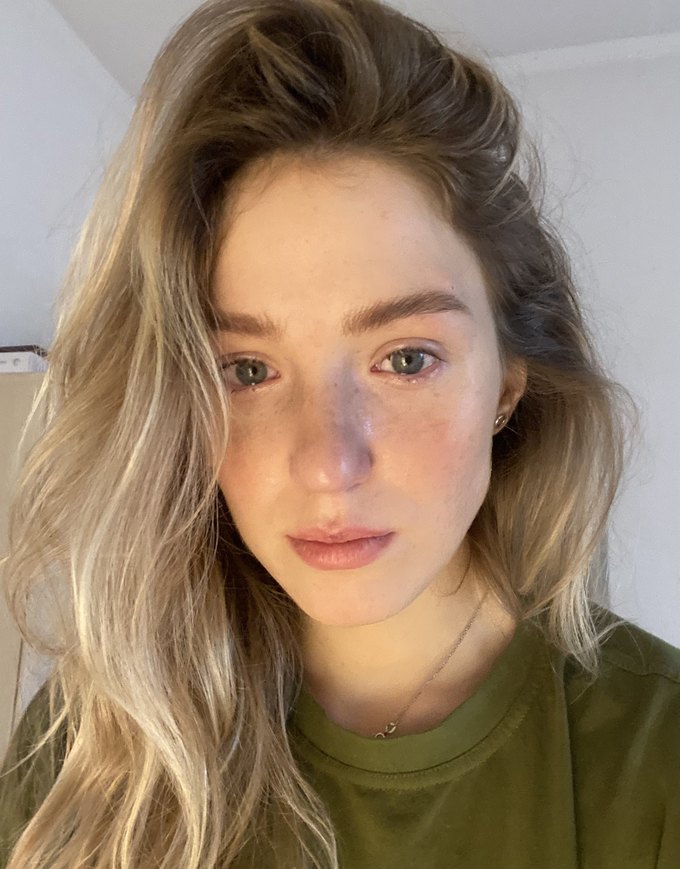
"The events that we staged in support of Ukrainian war prisoners are evolving to become a significant element of public consciousness. Memory, respect and gratitude to the defenders are spreading even among those who choose to turn a blind eye. We continue standing up for our defenders. Ukrainians should all wake up," Daria Chervona, co-founder of the "Tylovyki" (translated as “home front workers” in Ukrainian) project, wrote on Instagram.
Liza Bykova, Kyiv
Photo via Author and the Association of Azovstal Defenders’ Families


